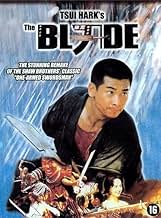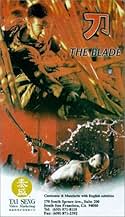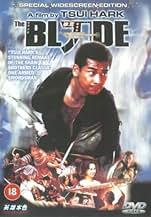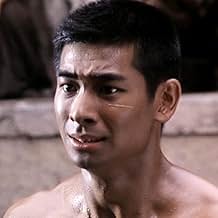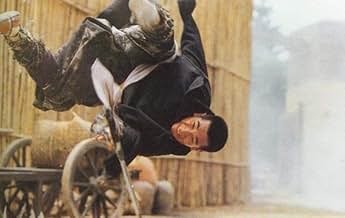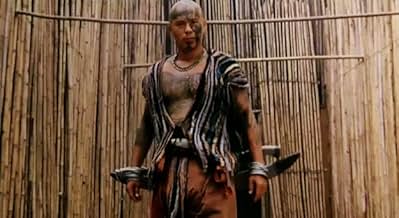VALUTAZIONE IMDb
6,9/10
3759
LA TUA VALUTAZIONE
Aggiungi una trama nella tua linguaA swordsmith trains his friend's orphaned son. The boy seeks revenge for his father's murder but loses an arm rescuing the swordsmith's daughter. A hermit girl nurses him, and he learns swor... Leggi tuttoA swordsmith trains his friend's orphaned son. The boy seeks revenge for his father's murder but loses an arm rescuing the swordsmith's daughter. A hermit girl nurses him, and he learns swordsmanship with his father's broken sword.A swordsmith trains his friend's orphaned son. The boy seeks revenge for his father's murder but loses an arm rescuing the swordsmith's daughter. A hermit girl nurses him, and he learns swordsmanship with his father's broken sword.
- Regia
- Sceneggiatura
- Star
- Premi
- 1 vittoria e 2 candidature totali
Xiong Xinxin
- Fei Lung
- (as Xin Xin Xiong)
Collin Chou
- Fast Sabre (Guest star)
- (as Sing Ngai)
Recensioni in evidenza
It's rare to see unique perspectives on film during the later '90's. The camera work was interesting. I knew nothing of the director, nor of any of the actors before seeing this movie. Therefore, I "went in blind", with no pre-conceptions. The movie has good action and some gore. Well, ample gore (a plus in my book).
Anyways, some people may find the movie a bit confusing and dis-orienting because the action is fast and furious when it happens. In fact, at times it was difficult for me see who was gashing who. I have to suppose that the camera was speeded up, but it wasn't obvious except that a person should be breathing harder than they were if they were actually moving as fast as it looked they were.
I liked the realistic "gritty" aspects of the lifestyle of the characters that was portrayed in this film. I read in another of the "comments" that the film basically "flopped". Thats unfortunate. People missed out on this one.
I can't comment on the dubbing because the film I saw was in Chinese with English sub-titles, so there was none of that "cheesy voice-makeovers" that usually go on Asian films. Were do they find those voices anyway?
Oh, and the final battle, Excellent!
Anyways, some people may find the movie a bit confusing and dis-orienting because the action is fast and furious when it happens. In fact, at times it was difficult for me see who was gashing who. I have to suppose that the camera was speeded up, but it wasn't obvious except that a person should be breathing harder than they were if they were actually moving as fast as it looked they were.
I liked the realistic "gritty" aspects of the lifestyle of the characters that was portrayed in this film. I read in another of the "comments" that the film basically "flopped". Thats unfortunate. People missed out on this one.
I can't comment on the dubbing because the film I saw was in Chinese with English sub-titles, so there was none of that "cheesy voice-makeovers" that usually go on Asian films. Were do they find those voices anyway?
Oh, and the final battle, Excellent!
A beautifully filmed story of love and heroism, hate and revenge. The main character leaves in pursuit of his father's murderer, brandishing his broken sword as his weapon. Unfortunately, in his first confrontation with the murderer, a tattooed character that looks like he jumped from the pages of a comic book, our hero is brutally beaten and loses an arm. Forced to live a young boy he trains himself in a one-handed sword technique from a book called The Blade, and sets of in search of revenge again.
9zdac
The Blade is a whirlwind of blood, dust, and psychedelic colour. Beneath its rough, brutal appearance lies an uncompromising and technically evolved offering from Hong Kong's prolific director/producer giant Tsui Hark. Based on the old-school kung-fu classic The One-Armed Swordsman, The Blade tells the story of a young man adopted by a renowned blacksmith, who discovers that his true father was killed by superstitiously powerful bandit named Lung, "who it is said can fly!".
When he impulsively goes out seeking revenge, he runs afoul of a gang of desert scum and loses his right arm in the encounter. Ashamed, he goes into hiding but after finding an broken weapon and the tatters of an old swordfighting manual, he begins to come to terms with his self-loathing, and eventually learns to compensate for his loss. With half a sword, half a technique, and still one arm short of a pair, he returns to his old home to confront both his past and the man who murdered his father.
A simple tale of vengeful perseverance here gets a nihilistic gritty art-house treatment. The action takes place in an amoral, almost post-apocalyptic desert landscape. Hark's camera speeds around with abandon, capturing both the bleak setting and the lush expressive palette of the characters' internal emotional landscape. In terms of camera style and visual dynamism, this is Hark's most adventurous film. Although seemingly frantic, it is never random. The cinematography bears a meticulous attention to detail, and the editing has a razor-sharp rhythm of its own.
There's a lot going on under the surface here. The simple story is fleshed out with a dark sensuality. Along with themes of surmounting obstacles through hard work, and misplaced honour in a harsh and selfish world (kung fu movie essentials), we find commentary on lust, gender, and simple pragmatism as well. Early on, a Shaolin monk, icon of heroism, meets a grisly, inglorious end, signifying that this is not just another heroic martial-arts fantasy. And yet heroism survives, in the form of a crippled man with a broken, cleaver-like weapon... just one more way The Blade offers new twists on old conventions.
This being a Hong Kong martial-arts movie, the action is to be noted. Where fluid idealized wushu forms might normally prevail, a certain street-level grittiness and desperation takes hold. Even when characters are performing incredible feats, you find yourself thinking "So this is what kung-fu fighting was really like."
Although Chiu Cheuk and villainous Xiong Xin Xin can certainly deliver spectacular physical displays (as seen in Hark's later Once Upon A Time in China films), in The Blade the camera and editing take the lead. While some reviewers tend to forget the "cinema" part of "martial arts cinema", and complain that much of the action is concealed by the breakneck editing and moving camera, there is still an impressive amount of wushu on display in this film, and the frenzied cutting serves to heighten the excitement and the abilities of the performers, even without implied supernatural powers or gratuitous wire stunts. As a result, the final 15 minutes of this movie frame possibly some of the most furious, breathless, vicious fight sequences in cinema history.
Believe it!
When he impulsively goes out seeking revenge, he runs afoul of a gang of desert scum and loses his right arm in the encounter. Ashamed, he goes into hiding but after finding an broken weapon and the tatters of an old swordfighting manual, he begins to come to terms with his self-loathing, and eventually learns to compensate for his loss. With half a sword, half a technique, and still one arm short of a pair, he returns to his old home to confront both his past and the man who murdered his father.
A simple tale of vengeful perseverance here gets a nihilistic gritty art-house treatment. The action takes place in an amoral, almost post-apocalyptic desert landscape. Hark's camera speeds around with abandon, capturing both the bleak setting and the lush expressive palette of the characters' internal emotional landscape. In terms of camera style and visual dynamism, this is Hark's most adventurous film. Although seemingly frantic, it is never random. The cinematography bears a meticulous attention to detail, and the editing has a razor-sharp rhythm of its own.
There's a lot going on under the surface here. The simple story is fleshed out with a dark sensuality. Along with themes of surmounting obstacles through hard work, and misplaced honour in a harsh and selfish world (kung fu movie essentials), we find commentary on lust, gender, and simple pragmatism as well. Early on, a Shaolin monk, icon of heroism, meets a grisly, inglorious end, signifying that this is not just another heroic martial-arts fantasy. And yet heroism survives, in the form of a crippled man with a broken, cleaver-like weapon... just one more way The Blade offers new twists on old conventions.
This being a Hong Kong martial-arts movie, the action is to be noted. Where fluid idealized wushu forms might normally prevail, a certain street-level grittiness and desperation takes hold. Even when characters are performing incredible feats, you find yourself thinking "So this is what kung-fu fighting was really like."
Although Chiu Cheuk and villainous Xiong Xin Xin can certainly deliver spectacular physical displays (as seen in Hark's later Once Upon A Time in China films), in The Blade the camera and editing take the lead. While some reviewers tend to forget the "cinema" part of "martial arts cinema", and complain that much of the action is concealed by the breakneck editing and moving camera, there is still an impressive amount of wushu on display in this film, and the frenzied cutting serves to heighten the excitement and the abilities of the performers, even without implied supernatural powers or gratuitous wire stunts. As a result, the final 15 minutes of this movie frame possibly some of the most furious, breathless, vicious fight sequences in cinema history.
Believe it!
It's a shame that a wonderful movie such as THE BLADE received so little coverage/attention from the masses. The only time I have heard about it was from a renounced film critic in HK, and he RAVED about it. And he sure was RIGHT! Tsui Hark did an excellent job here. The atmosphere is good, and the characters are real. As for the action, yes, it's a little too fast, but nonetheless beautifully choreographed.
The great thing about this film (and the sort of thing that upsets people who like seeing martial arts fights where you can see every kick and every punch) is that most of the fighting is just blurs of motion punctuated by shouting and clashing blades. This is what I love in HK fantasies: fight scenes that are so incomprehensible you're left going: huh?
Tsui Hark's best example is Zu: Warriors from the Magic Mountain, where the viewer has to actually fill in the blanks for themselves. It's edited in such a way that that the film we see feels like only a portion of the story. In some contexts this technique would be stupid, but in fantasy it's wonderful. It's the inverse of the computer graphics bare-all approach, and it's lucky that we had the HK film industry to provide an alternative to Hollywood in this regard. (I say had, because, since Storm Riders, cg in HK is more prevalent than before.)
This approach to fight scenes is impressionistic, and with the final fightscene in Dao it's almost operatic. At no stage do you get a feeling that the fight is actually rational. The use of sound and music in the film is also wonderful, especially in the menacing flashback scene. It's hard to think of a more effective way of setting up a backstory, and gives new life to that tired old cliche, the revenge story.
So that's all good. Sometimes, however, the impressionism gets a bit out of hand. Things take on a Wong Kar Wai pretentiousness, like the horrible Ashes of time, where Leslie Cheung sits around feeling sorry for himself for no appreciable reason. In Dao, the voiceover of the female character gets really annoying. Her mutterings only really serve to remind us she is there, as she has only one pivotal scene in the film (where tells the hero his origin story).
The film is also a bit over-bloody for my taste, but it certainly leaves one with no illusions about the brutalness of the world in which the film is set.
Dao is one of those films that is so strange and vivid it leaves a strong resonance with the viewer long after it is over. It has faults by the barrel, but I'd rather have it and Tsui Hark with us than a legion of James Camerons and Roland Emmerichs.
Tsui Hark's best example is Zu: Warriors from the Magic Mountain, where the viewer has to actually fill in the blanks for themselves. It's edited in such a way that that the film we see feels like only a portion of the story. In some contexts this technique would be stupid, but in fantasy it's wonderful. It's the inverse of the computer graphics bare-all approach, and it's lucky that we had the HK film industry to provide an alternative to Hollywood in this regard. (I say had, because, since Storm Riders, cg in HK is more prevalent than before.)
This approach to fight scenes is impressionistic, and with the final fightscene in Dao it's almost operatic. At no stage do you get a feeling that the fight is actually rational. The use of sound and music in the film is also wonderful, especially in the menacing flashback scene. It's hard to think of a more effective way of setting up a backstory, and gives new life to that tired old cliche, the revenge story.
So that's all good. Sometimes, however, the impressionism gets a bit out of hand. Things take on a Wong Kar Wai pretentiousness, like the horrible Ashes of time, where Leslie Cheung sits around feeling sorry for himself for no appreciable reason. In Dao, the voiceover of the female character gets really annoying. Her mutterings only really serve to remind us she is there, as she has only one pivotal scene in the film (where tells the hero his origin story).
The film is also a bit over-bloody for my taste, but it certainly leaves one with no illusions about the brutalness of the world in which the film is set.
Dao is one of those films that is so strange and vivid it leaves a strong resonance with the viewer long after it is over. It has faults by the barrel, but I'd rather have it and Tsui Hark with us than a legion of James Camerons and Roland Emmerichs.
Lo sapevi?
- QuizOne of Quentin Tarantino's 20 Favourite Movies from 1992 to 2009.
- BlooperThe tattoos on Fei Lung's chest disappear when Ding On throws the blade at his throat in the finale.
- ConnessioniFeatured in Video Buck: TOP 13: Las mejores películas de artes marciales (2017)
I più visti
Accedi per valutare e creare un elenco di titoli salvati per ottenere consigli personalizzati
- How long is The Blade?Powered by Alexa
Dettagli
Contribuisci a questa pagina
Suggerisci una modifica o aggiungi i contenuti mancanti


